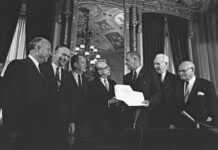Robert L. Johnson Applauds The Federal Communications Commission For Its Favorable Vote On The Universal Set-Top Box Which Will Greatly Enhance Minority Diversity In Programming Across All Media Formats
Robert L. Johnson, Chairman of RLJ Entertainment (NASDAQ: RLJE) and Founder of Black Entertainment Television commends the Federal Communications Commission (FCC) for voting favorably for a Notice of Proposed Rulemaking to unlock the set-top box. This rule-making will give consumers the choice to purchase universal set-top devices that can combine traditional cable programming with streaming video content in an integrated user interface that puts all content on equal footing and brings an end to mandatory, expensive cable boxes.
Johnson stated, “I applaud the Federal Communications Commission for today’s favorable rule-making. The universal set-top box, unlike the leased cable box, will increase consumer choice, save consumers billions of dollars from monthly lease bills, and can combine traditional cable programming with streaming video content that puts content on an equal footing.
I personally want to thank Commissioner Mignon Clyburn, the Commission’s only African American member, for joining FCC Chairman Tom Wheeler and Commissioner Jessica Rosenworcel in supporting the universal set-top box proposal. I also commend Commissioner Clyburn for her leadership on launching a Notice of Inquiry to focus on what role the FCC can play in increasing diversity of content across all media platforms.
RLJ Entertainment has two proprietary digital streaming channels with exclusive and niche-focused content – AcornTV (British mystery and drama) and UMC – Urban Movie Channel (urban-themed programming) – that are available on a variety of platforms but would be better accessed if consumers could also find these and other streaming channels on their set-top boxes.
Minority programmers, who have traditionally had their voices in media restricted by distribution gatekeepers who have controlled access based on either a lack of appreciation of diversity or misguided beliefs that there isn’t economic value in minority content will now have the chance to have their programming viewed. Minority programmers are simply seeking an opportunity to have their content seen and their voices heard.”







